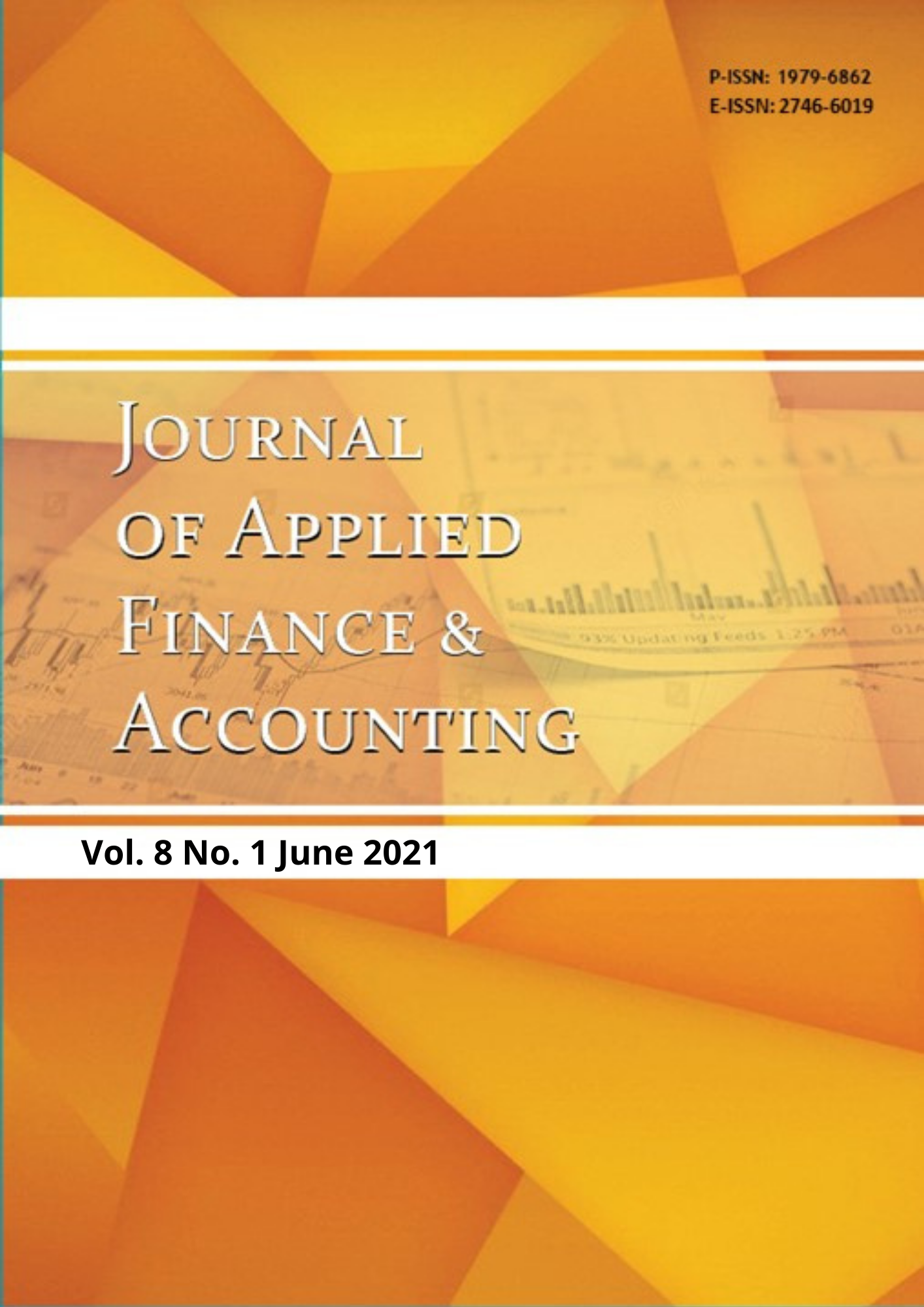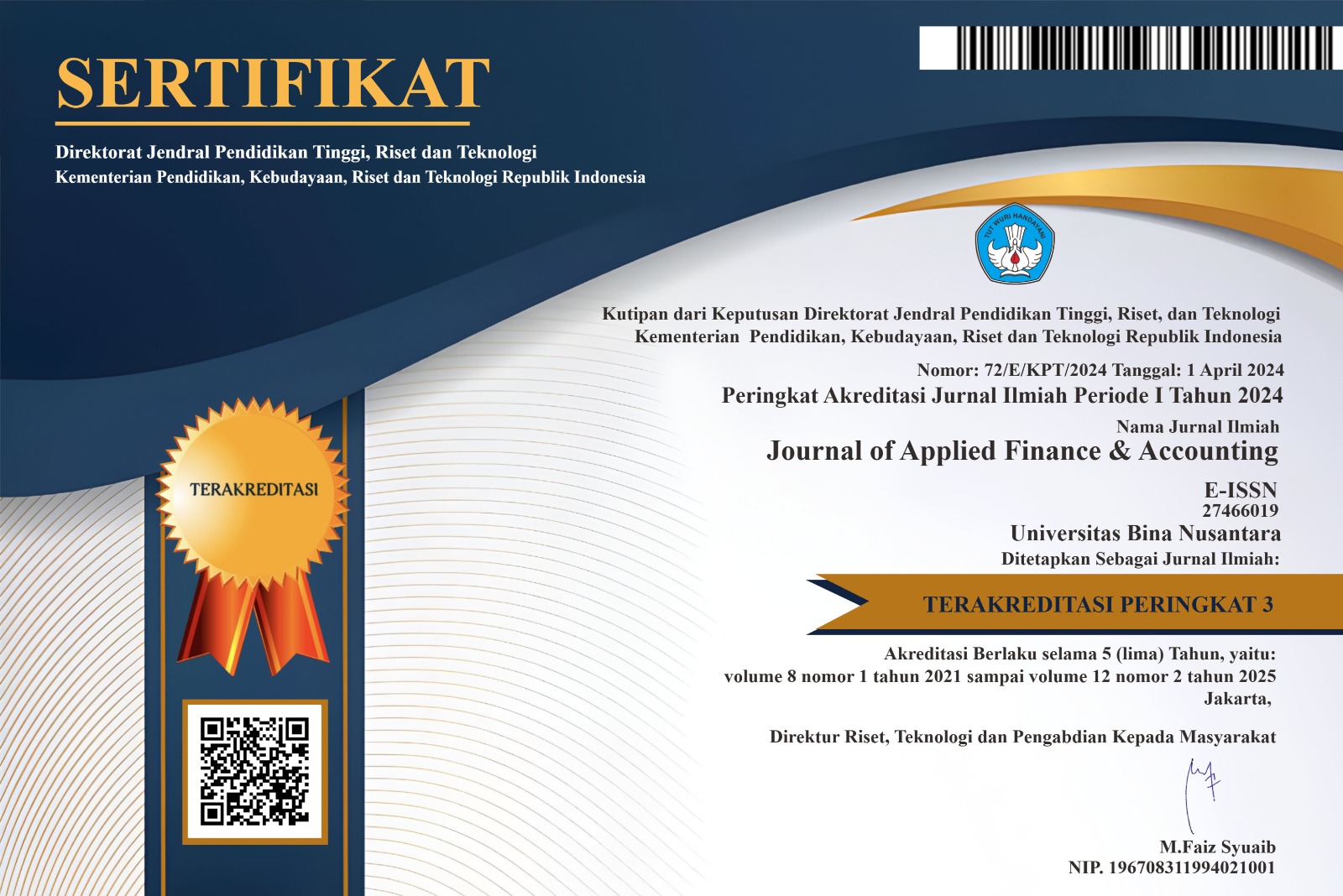CORPORATE GOVERNANCE AND EARNINGS MANAGEMENT: EVIDENCE OF LISTED INDONESIAN COMPANIES
DOI:
https://doi.org/10.21512/jafa.v8i1.7381Keywords:
Earnings Management, Competence of Board Commissioner, Competence of Audit Committee, Audit Quality, Revenue GrowthAbstract
The purpose of this research is to investigate the relationship of corporate governance  such as competence of board commissioner and audit committee, audit quality and earnings management in 434 manufacturing sector companies listed in Indonesia Stock Exchange period year 2016-2018. Earnings management proxied by discretionary accrual and profitability proxied by return-on-asset. The results of this study are: (1) firm’s size as control variable is significantly negative influences earnings management (2) profitability which proxied by return-on-asset is significantly negative influences earnings management. Meanwhile, this research did not find support evidence that competence of board commissioner, competence of audit committee, audit quality, revenue growth connection significantly influences on earnings management. Companies can analyze the earnings management through company size and financial ratios such as profitability.
References
Afni, S. M., Ratnawati, V., & Basri, Y. M. (2014). Pengaruh Persistensi Laba, Alokasi Pajak Antar Periode, Ukuran Perusahaan, Pertumbuhan Laba Dan Profitabilitas Terhadap Kualitas Laba. Economiv, 21.
Aryanti, G. A., & Sisdyani, E. A. (2016). Profitabilitas pada Earnings Response Coefficient dengan Pengungkapan Corporate Social Responsibility Sebagai Variabel Pemoderasi. E-Jurnal Akuntansi Universitas Udayana, 15(1), 171-199.
Bellovary, JL., Gaicomino, DE., dan Akers, MD. (2005). Earnings Quality: It’s Time to Measure and Report. The CPA Journal: 72(11): 32-37.
Bursa Efek Indonesia. (2018). Laporan Keuangan dan Tahunan. Retrieved July-October 2018, from Bursa Efek Indonesia: www.idx.co.id
Charitou, A., Clubb, C., & Andreou, A. (2001). The Effect of Earnings Permanence, Growth and Firm Size on the Usefulness of Cash Flows and Earnings in Explaining Security Returns: Empirical Evidence for the UK. Journal of Business Finance & Accounting, 32.
Chtourou, S.M., Bedard, J., & Courteau, L. (2001). Corporate governance and earning management.
DeAngelo, L.E. (1981). “Auditor Independence, “Low Balling”, and Disclosure Regulation”. Journal of Accounting and Economics. August.
Dechow, P.M., Sloan, R.G., Sweeney, A.P, 1995. Detecting Earnings Management. The Accounting Review 70, 193-225
Dechow, P.M., Weili Ge, dan C. Schrand. (2010). Understanding Earnings Quality: A Review of the Proxies, Their Determinants and Their Consequences.Journal of Accounting and Economics, 50.
Francis, J., dan D. Wang. (2008). The Joint Effect of Investor Protection and Big 4 Audits on Earnings Quality Around The World. Contemporary Accounting Research, 25 (1), 1–39.
Ghosh, A., Gu, Z., & Jain, P. C. (2005). Sustained Earnings and Revenue Growth, Earnings Quality, and Earnings Response Coefficients. 34.
Gujarati, D.N. (2004) Basic Econometrics. 4th Edition, McGraw-Hill Companies.
Hermawan, A. A. (2011). THE INFLUENCE OF EFFECTIVE BOARD OF COMMISSIONERS AND AUDIT COMMITTEE ON THE INFORMATIVENESS OF EARNINGS: EVIDENCE FROM INDONESIAN LISTED FIRMS. Asia Pacific Journal of Accounting and Finance Volume 2 (1), December 2011, 38.
Herawaty, V. (2008). Peran Praktek Corporate Governance Sebagai Moderating Variable Dari Pengaruh Earnings Management Terhadap Nilai Perusahaan. Simposium Nasional Akuntansi XI
IAI. (2012). PSAK No.1: Penyajian Laporan Keuangan. Jakarta: Salemba Empat.
Jensen, C., & Meckling, H. (1976). Theory of the firm : managerial behavior, agency costs and ownership structure. Journal of Financial Economics, 3, 305–360.
Keputusan Ketua Badan Pengawas Pasar Modal (Bapepam) dan Lembaga Keuangan. Nomor : Kep-643/BL/2012 tentang Pembentukan dan Pedoman Pelaksanaan Kerja Komite Audit.
Kieso, D., Weygandt, J., & Warfield, T. (2015). Intermediate Accounting: IFRS Edition, 2nd Edition. London: John Wiley and Sons.
Kusumastuti, S., Supatmi, & Sastra, P. (2007). Pengaruh Board Diversity Terhadap Nilai Perusahaan Dalam Perspektif Corporate Governance. Jurnal Akuntansi Dan Keuangan, 9(2), 88–98.
Lamb. Jr, Charles. W, Joseph. F. Hair and Carl Mcdaniel. (2004). Marketing. 7th Edition. Canada: Thomson.
Nelson, S. P., & Devi, S. (2013). Audit Committee Experts and Earnings Quality. Corporate Governance International Journal of Business in Society, 18.
Perotti, P., & Wagenhofer, A. (2014). Earnings Quality Measures and Excess Returns. Journal of Business Finance & Accounting.
Rezaee, Zabihollah. (2004). Restoring Public Trust In The Accounting Profession by Developing Anti-Fraud Education, Programs, and Auditing. Managerial Auditing Journal Vol. 19 No. 1, hal. 134-148.
Silfi, Alfiati. (2016). Pengaruh pertumbuhan laba, struktur modal, likuidtas dan komite audit terhadap kualitas laba. Jurnal Valuta, Vol 2, No. 1, hal. 17- 26.
Siregar, S.V., Sidharta Utama (2008). Type of earnings management and the effect of ownership structure, firm size, and corporate governance practices: evidence from Indonesia. The International Journal of Accounting, 43, 1- 27.
The Statement of Financial Accounting Concept (SFAC) No.1. 1978. Financial Accounting Standards Board (FSAB).
Wijaya, N., & Soly, N. (2017). Faktor-Faktor yang Mempengaruhi Kualitas Laba pada Perusahaan Manufakur. Jurnal Bisnis dan Akuntansi, 19(1), 47-55.
Xie, B., Davidson, W. N., & DaDalt, P. J. (2003). Earnings management and corporate governance: the role of the board and the audit committee. Journal of Corporate Finance 9 , 22.
Yodbutr, A. (2017). CORPORATE GOVERNANCE AND EARNINGS QUALITY: THE CASE OF THAI FINANCIAL INSTITUTIONS. International Journal of Management and Applied Science (IJMAS).PP.98-102. Volume-3,Issue-3. Faculty of Business Administration, 5.
Downloads
Published
Issue
Section
License
Authors who publish with this journal agree to the following terms:
Authors retain copyright and grant the journal right of first publication with the work simultaneously licensed under a Creative Commons Attribution License that allows others to share the work with an acknowledgement of the work's authorship and initial publication in this journal.
Authors are able to enter into separate, additional contractual arrangements for the non-exclusive distribution of the journal's published version of the work (e.g., post it to an institutional repository or publish it in a book), with an acknowledgement of its initial publication in this journal.
Authors are permitted and encouraged to post their work online (e.g., in institutional repositories or on their website) prior to and during the submission process, as it can lead to productive exchanges, as well as earlier and greater citation of published work (See The Effect of Open Access).





